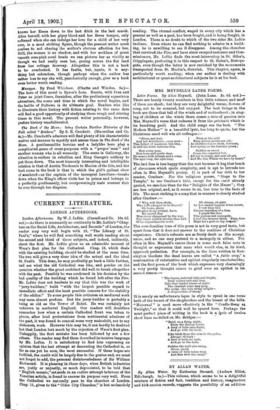MRS. MEYNELL'S LATER POEMS.
Later Poems. By Alice Meynell. (John Lane. 28. 6d. net.)— There are barely twenty numbers in this little volume, and most of them are short ; but they are very delightful verses, flowers of song, not to be counted, but enjoyed. The best things in the book are those that tell of the winds and of motherhood ; in sing- ing of children or the winds there comes a note of passion into Mrs. Meynell's verse that redeems it from the preciosil4 which is its besetting peril. And the child songs are the best. " The Modern Mother" is a beautiful lyric, too long to quote, but the Christmas carol will win all suffrages :—
Even as the cold Keen winter grows not old; As childhood is so fresh, foreseen, And spring in the familiar green ; Sudden as sweet Come the expected feet,
All joy is young, and new all art,
And He, too, Whom we have by heart.*
The last line is less happy than the rest because it haa that touch of cleverness which spoils simplicity, and is apt to intrude too often in Mrs. Meynell's poetry. It is part of her debt to her master, Crasbaw. For the religious poems, " Steps to the Temple," to use Crashaw's title, except for the carol already quoted, we care less than for the " Delights of the Muses "; they are less original, and, as it seems to us, less true to the facts of life. The most striking is a song that in manner is closely studied after Crasbaw
Why wilt thou chide, Oh strong, oh pure Who linAt attained to be denied ? As Yea makes happier loves secure, Oh learn, above I vow thee this All price is my refusal, Love. Unique rejection of a kiss. My sacred Nay I guard for thee
Was never cheapened by the way. This jealous sad monopoly.
Thy single sorrow crowns thee lord I seal this honour thine. None dare Of an unpurchasable word. Hope for a part in thy despair."
The over-familiar tone of this poem is not in very good taste, but apart from that it does not answer to the realities of Christian experience. Christ's refusals are as freely dealt as His accept- ances, and no one may pretend to a monopoly in either. Too often in Mrs. Meynell's verses there is some such false note in thought or expression that mars what would else, in its kind, approach perfection. For example, in the lines written in Ken- sington Gardens the dead leaves are called " a futile crop;" a combination of substantive and epithet singularly unscholarlike; and the first poem of the book which expresses very charmingly a very pretty thought comes to grief over an epithet in its second stanza:—
She roams maternal bills and bright, Dark valleys safe and deep. Into that tender breast at night The chastest stars may peep. She walks—the lady of my delight--A shepherdess of sheep."
It is surely an unfortunate lapse in style to speak in one verse both of the breast of the shepherdess and the breast of the hills. "Maternal " is used more effectively in the " Cradle-Song at Twilight," so that it could well be spared here. Perhaps the most perfect piece of writing in the book is a lyric of twelve short lines modelled on Mr. Bridges :—
" Brief, on a flying night, From the shaken tower, A flock of bells take flight, And go with the hour.
Like birds from the cote to the gales.
Abrupt-0 hark !
A fleet of bells set sails, Andigo to the dark.
Sudden the cold airs swing. Alone, aloud A verse of bells takes wing And flies with the cloud." "Given, not lent, And not withdrawn—once sent— This Infant of mankind, this One, Is still the little welcome Son.
New every year,
New-born and newly dear,
He oomes with tidings and a song, The ages long, the ages long.










































 Previous page
Previous page